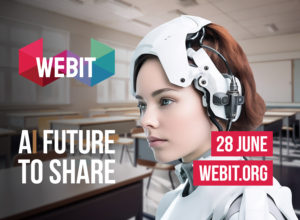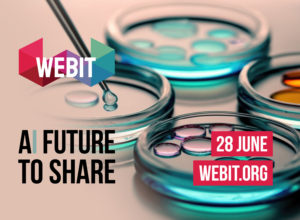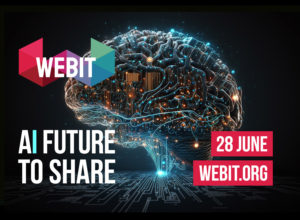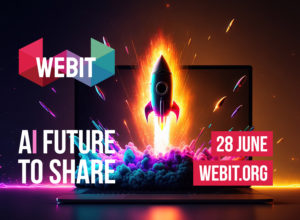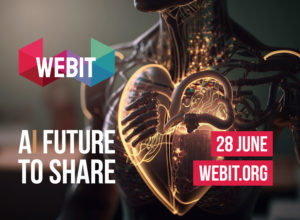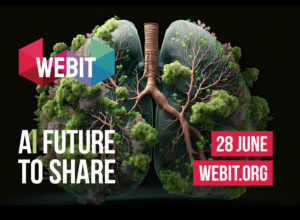Will technology actually enhance critical thinking skills and what role teachers...
The future of education is likely to be heavily influenced by technology and new pedagogical approaches.
There is some concern that the widespread availability of information through technology may lead to a decrease in critical thinking and analytical skills.
In fact, many argue that technology can actually enhance critical thinking skills by providing students with access to a wider range of perspectives and sources of information. Additionally, with the increasing amount of information available, it will become more important for individuals to develop strong analytical skills to be able to sift through and make sense of it all.
That being said, it is important for individuals to be aware of the potential biases and limitations of the information they are accessing, and to be able to evaluate it critically. Teachers can play an important role in helping students develop these skills.
As technology continues to advance, we are likely to see more personalized and adaptive learning experiences, as well as the widespread use of online and blended learning models.
However, while technology can enhance the learning experience, teachers are still essential for providing guidance, support, and feedback to students. In fact, in a world where information is abundant, teachers will become even more important as facilitators of learning and critical thinking.
Additionally, teachers are often the ones who provide a sense of community and social interaction for students. This is particularly important for younger students who require more hands-on support and guidance. Overall, while the role of teachers may evolve in the future, they will still be a vital part of the education system.
While technology may change the way we access and process information, it is unlikely to lead to a decrease in thinking capability. Rather, it will require individuals to develop new skills and ways of thinking to navigate the information landscape.
Lear more live at Webit Summer Edition in Sofia on 28th June 2023.
Future of Impact – New Materials trends will be highlighted during...
There are many new materials being developed and researched constantly. The possible outcomes are vast and hold the potential for groundbreaking technological advances in various fields such as energy, electronics, biomedicine, construction, agriculture, etc. Some of the new materials that have attracted attention recently are:
Graphene is an ultra-light material made of a single layer of carbon atoms; it has extraordinary electrical conductivity, extremely low resistivity and tens of times strength over the steel - potential applications in electronics, military, etc.
Aerogels are extremely lightweight and porous materials with low density, low thermal conductivity and excellent thermal insulation properties - potential applications in construction, environmental protection, etc.
Shape-memory alloys are metals that can "remember" their original shape and return to it when heated; they have high strength, low magnetic loss and excellent liquid flow - potential applications in aerospace, electronics, etc.
Nanocellulose is lightweight, strong, and sustainable material made from plant fibers; it has good biocompatibility, water holding capacity and wide range of pH stability - potential applications in building materials, biomedicine, etc.
Bioplastics are plastics made from renewable biomass sources, such as corn starch, sugarcane or potato starch; they are naturally degradable and reduce dependence on fossil resources, i.e. less environmental pollution - potential applications in packaging, agriculture, etc.
During the last edition of Webit Founders Games in January 2023 among the finalists of the competition was ELEPHANT IN A BOX - a material innovation company from the United States. The company mission is to disrupt the furniture and construction industries. Founded in 2020 by Daniela Terminel and Reham Khalifa, the women-led startup is bringing honeycomb structures from aircrafts and race cars to furniture sofas and sectionals by developing and patenting the HoneyComb Support Technology (HoST). The products are made of paper, the material is 100% biodegradable and recyclable. It takes a fraction of the space of shipping and storage when compressed. The manufacturing process involves significantly less components which makes it simpler and faster. From a customer perspective, the products are stronger, easy to move and also kind to the environment.
 ELEPHANT IN A BOX, alongside other Founders Games Finalists in Davos.
When attending the summer edition of Webit you will have great opportunities to meet and exchange ideas with other professionals, to explore innovative solutions provided by the event prominent partners and to join the inspiring community of Webit!
ELEPHANT IN A BOX, alongside other Founders Games Finalists in Davos.
When attending the summer edition of Webit you will have great opportunities to meet and exchange ideas with other professionals, to explore innovative solutions provided by the event prominent partners and to join the inspiring community of Webit!
 ELEPHANT IN A BOX, alongside other Founders Games Finalists in Davos.
When attending the summer edition of Webit you will have great opportunities to meet and exchange ideas with other professionals, to explore innovative solutions provided by the event prominent partners and to join the inspiring community of Webit!
ELEPHANT IN A BOX, alongside other Founders Games Finalists in Davos.
When attending the summer edition of Webit you will have great opportunities to meet and exchange ideas with other professionals, to explore innovative solutions provided by the event prominent partners and to join the inspiring community of Webit!
Securing Our Digital Future: Exploring the Exciting Developments in Cybersecurity
Cybersecurity is an ever-increasing concern in our increasingly digital world. With more and more of our personal and financial information stored online, it's essential to take steps to protect ourselves and our data from cyber attacks. The future of cybersecurity is exciting, with new technologies and strategies being developed to keep us safe.
Artificial intelligence is becoming an essential tool in the fight against cyber attacks. AI can analyze vast amounts of data, detect patterns, and identify potential threats quickly. It can also help automate cybersecurity processes, such as updating software and patching vulnerabilities. AI is also being used to develop predictive models that can anticipate cyber attacks before they happen. This helps organizations take proactive measures to protect themselves from potential threats.
Cloud computing has become an integral part of many businesses, but it also comes with its own set of cybersecurity challenges. Cloud security involves protecting data stored in the cloud from unauthorized access, data breaches, and other cyber threats. Cloud providers are continually improving their security measures to protect against cyber attacks, including encryption, access control, and regular vulnerability assessments.
 Blockchain technology is best known for its use in cryptocurrency, but it also has potential for cybersecurity. Blockchain can be used to create a decentralized system that can verify and secure digital transactions, making it more difficult for hackers to tamper with the data. In addition, blockchain can be used to create a secure identity management system that can protect against identity theft and unauthorized access to sensitive information.
One of the most effective ways to protect against cyber attacks is user education. By educating people about the risks and best practices for online security, we can reduce the likelihood of cyber attacks and data breaches. It's also important to be aware of the risks associated with social media and to use privacy settings to protect personal information.
Cybersecurity is a critical concern in today's digital world, and the future of cybersecurity looks promising. With the continuous advancements in AI, cloud security, blockchain technology, and user education, we are better equipped than ever before to protect ourselves and our data from cyber threats. However, cybercriminals are also getting more sophisticated and finding new ways to attack, so it is essential to stay informed and vigilant. By working together and staying ahead of the curve, we can secure our digital future and enjoy the benefits of a safer and more connected world.
Join us at Webit and learn more about the Future of cybersecurity.
Blockchain technology is best known for its use in cryptocurrency, but it also has potential for cybersecurity. Blockchain can be used to create a decentralized system that can verify and secure digital transactions, making it more difficult for hackers to tamper with the data. In addition, blockchain can be used to create a secure identity management system that can protect against identity theft and unauthorized access to sensitive information.
One of the most effective ways to protect against cyber attacks is user education. By educating people about the risks and best practices for online security, we can reduce the likelihood of cyber attacks and data breaches. It's also important to be aware of the risks associated with social media and to use privacy settings to protect personal information.
Cybersecurity is a critical concern in today's digital world, and the future of cybersecurity looks promising. With the continuous advancements in AI, cloud security, blockchain technology, and user education, we are better equipped than ever before to protect ourselves and our data from cyber threats. However, cybercriminals are also getting more sophisticated and finding new ways to attack, so it is essential to stay informed and vigilant. By working together and staying ahead of the curve, we can secure our digital future and enjoy the benefits of a safer and more connected world.
Join us at Webit and learn more about the Future of cybersecurity.
 Blockchain technology is best known for its use in cryptocurrency, but it also has potential for cybersecurity. Blockchain can be used to create a decentralized system that can verify and secure digital transactions, making it more difficult for hackers to tamper with the data. In addition, blockchain can be used to create a secure identity management system that can protect against identity theft and unauthorized access to sensitive information.
One of the most effective ways to protect against cyber attacks is user education. By educating people about the risks and best practices for online security, we can reduce the likelihood of cyber attacks and data breaches. It's also important to be aware of the risks associated with social media and to use privacy settings to protect personal information.
Cybersecurity is a critical concern in today's digital world, and the future of cybersecurity looks promising. With the continuous advancements in AI, cloud security, blockchain technology, and user education, we are better equipped than ever before to protect ourselves and our data from cyber threats. However, cybercriminals are also getting more sophisticated and finding new ways to attack, so it is essential to stay informed and vigilant. By working together and staying ahead of the curve, we can secure our digital future and enjoy the benefits of a safer and more connected world.
Join us at Webit and learn more about the Future of cybersecurity.
Blockchain technology is best known for its use in cryptocurrency, but it also has potential for cybersecurity. Blockchain can be used to create a decentralized system that can verify and secure digital transactions, making it more difficult for hackers to tamper with the data. In addition, blockchain can be used to create a secure identity management system that can protect against identity theft and unauthorized access to sensitive information.
One of the most effective ways to protect against cyber attacks is user education. By educating people about the risks and best practices for online security, we can reduce the likelihood of cyber attacks and data breaches. It's also important to be aware of the risks associated with social media and to use privacy settings to protect personal information.
Cybersecurity is a critical concern in today's digital world, and the future of cybersecurity looks promising. With the continuous advancements in AI, cloud security, blockchain technology, and user education, we are better equipped than ever before to protect ourselves and our data from cyber threats. However, cybercriminals are also getting more sophisticated and finding new ways to attack, so it is essential to stay informed and vigilant. By working together and staying ahead of the curve, we can secure our digital future and enjoy the benefits of a safer and more connected world.
Join us at Webit and learn more about the Future of cybersecurity.
What will AI affect the most?
Artificial intelligence (AI) has already started transforming many industries and professions, making them more efficient, accurate, and cost-effective. While some people worry that AI will replace jobs, it's more likely that AI will change the nature of work, creating new opportunities and shifting job responsibilities.
The future of work is rapidly changing, with the rise of artificial intelligence (AI) and automation promising to transform the way we work and live. At Webit Summer edition, we'll explore how people will share the future with AI and why it's important to embrace this change.
AI will not replace human workers but rather augment their capabilities. AI can take over repetitive and mundane tasks, freeing up time for human workers to focus on more complex and creative tasks. For example, AI can analyze data and provide insights, while humans can interpret those insights and make decisions based on them. AI will create new opportunities for workers to learn new skills and take on more complex tasks. As AI takes over repetitive and mundane tasks, human workers will need to learn new skills such as data analysis, programming, and creative thinking. This will create new job opportunities and increase the demand for workers with these skills.It will enable humans and machines to work together in a more collaborative way. For example, AI can help humans to better understand data and make better decisions. Humans, on the other hand, can provide context, insights, and creativity that machines are not capable of.
AI will enable more personalized products and services, tailored to individual needs and preferences. For example, AI can analyze consumer data and provide personalized recommendations for products and services. This will create new opportunities for businesses to provide more personalized and customized products and services. It will increase efficiency and productivity in many industries, enabling businesses to do more with less. For example, AI can automate repetitive and mundane tasks, reducing the need for human workers to do them. This will enable businesses to focus on more complex and creative tasks, and improve overall productivity.
The future of work is rapidly changing, with the rise of artificial intelligence (AI) and automation promising to transform the way we work and live. While some people worry that AI will replace human workers, the reality is that people will share the future with AI. In this article, we'll explore how people will share the future with AI and why it's important to embrace this change.

 Sophia, the Robot during Webit.Festival Europe 2018
Join the discussion and learn from global leaders in the industry on 28th of June in Sofia. Tickets @ webit.org
Sophia, the Robot during Webit.Festival Europe 2018
Join the discussion and learn from global leaders in the industry on 28th of June in Sofia. Tickets @ webit.org

- Augmented Intelligence: AI will not replace human workers but rather augment their capabilities. AI can take over repetitive and mundane tasks, freeing up time for human workers to focus on more complex and creative tasks. For example, AI can analyze data and provide insights, while humans can interpret those insights and make decisions based on them.
- New Opportunities: AI will create new opportunities for workers to learn new skills and take on more complex tasks. As AI takes over repetitive and mundane tasks, human workers will need to learn new skills such as data analysis, programming, and creative thinking. This will create new job opportunities and increase the demand for workers with these skills.
- Collaborative Work: AI will enable humans and machines to work together in a more collaborative way. For example, AI can help humans to better understand data and make better decisions. Humans, on the other hand, can provide context, insights, and creativity that machines are not capable of.
- Personalization: AI will enable more personalized products and services, tailored to individual needs and preferences. For example, AI can analyze consumer data and provide personalized recommendations for products and services. This will create new opportunities for businesses to provide more personalized and customized products and services.
- Increased Efficiency: AI will increase efficiency and productivity in many industries, enabling businesses to do more with less. For example, AI can automate repetitive and mundane tasks, reducing the need for human workers to do them. This will enable businesses to focus on more complex and creative tasks, and improve overall productivity.
- Ethical considerations: As AI becomes more integrated into our daily lives, it is important to consider the ethical implications. For example, how can we ensure that AI is used in a way that is fair and does not perpetuate biases? How can we ensure that AI is used in a way that benefits society as a whole? These are important questions that we need to address as we continue to develop and use AI.
 Sophia, the Robot during Webit.Festival Europe 2018
Join the discussion and learn from global leaders in the industry on 28th of June in Sofia. Tickets @ webit.org
Sophia, the Robot during Webit.Festival Europe 2018
Join the discussion and learn from global leaders in the industry on 28th of June in Sofia. Tickets @ webit.org
Future of Work – the EdTech trends you do not want...
EdTech (Education Technology) has become increasingly important in recent years, particularly as more and more learning has shifted to remote or hybrid models due to the covid pandemic. EdTech has the potential to make education more accessible and inclusive, improve students’ attention and retention, and provide teachers with powerful tools for assessment and instruction. It is important to recognize that EdTech is not a substitute for effective education practices, and should be used in conjunction with other instructional strategies and pedagogies.
EdTech encompasses a broad range of essential tools - online learning platforms, education apps, digital textbooks, video conferencing and learning management systems. They are designed to improve education outcomes and facilitate the acquisition of knowledge and skills. Artificial intelligence offers personalized learning journeys for students. Gamification is considered one of the most effective engagement mechanisms. Virtual reality inspires imagination and creativity as students are “transported” out of the classroom.
During the last edition of Webit Founders Games in January 2023 one of the finalists in the competition was iSchool - the MENA leading online coding platform offering personalized live coding classes for primary to high school students. Founded in 2018, iSchool has been contributing to the STEM (Science, Technology, Engineering and Mathematics) education sector by their 1:1 or 1:6 classes in artificial intelligence, data science, game development, virtual and augmented reality. Students receive the tools for starting a career in programming, robotics, electronics, graphic design and more.
 Founders Games 2023 Finals in Davos.
This June Webit attendees will meet and learn from EdTech innovators and network within the inspiring community of Webit!
Founders Games 2023 Finals in Davos.
This June Webit attendees will meet and learn from EdTech innovators and network within the inspiring community of Webit!
 Founders Games 2023 Finals in Davos.
This June Webit attendees will meet and learn from EdTech innovators and network within the inspiring community of Webit!
Founders Games 2023 Finals in Davos.
This June Webit attendees will meet and learn from EdTech innovators and network within the inspiring community of Webit!
The Rise of MarTech and AdTech: How Technology is Transforming Marketing...
In recent years, the marketing and advertising industries have undergone a significant transformation thanks to the rise of technology. With the increasing importance of digital channels and the growing complexity of consumer behavior, marketers and advertisers have turned to technology to help them navigate these challenges. This has led to the emergence of two related fields: MarTech and AdTech.
MarTech, or marketing technology, refers to the use of technology to support various aspects of marketing, such as customer data management, campaign management, content management, social media marketing, and analytics. The goal of MarTech is to help marketers better understand their target audience, optimize marketing campaigns, and measure the success of their marketing activities.
AdTech, or advertising technology, is a subset of MarTech that focuses specifically on the use of technology to manage and optimize advertising campaigns. AdTech tools help advertisers to identify the right audience for their ads, select the best ad formats, and measure the effectiveness of their advertising campaigns.
The rise of MarTech and AdTech has been driven by several factors, including the increasing importance of digital channels, the growth of social media, and the availability of big data. With consumers spending more time online and engaging with brands through various digital channels, marketers and advertisers need to be able to keep up with these trends in order to remain relevant. MarTech and AdTech tools help marketers and advertisers to do just that, by providing them with the ability to analyze vast amounts of data in real-time and make more informed decisions about their marketing and advertising strategies. This has led to increased efficiency and effectiveness in marketing and advertising, as well as greater ROI for businesses.
As technology continues to evolve, the future of MarTech and AdTech looks bright. New technologies such as artificial intelligence, machine learning, and blockchain are already being integrated into MarTech and AdTech tools, providing even more advanced capabilities for marketers and advertisers. For example, AI-powered chatbots are being used by businesses to provide 24/7 customer support, while machine learning algorithms are helping marketers to personalize their content and ads based on individual user preferences. Meanwhile, blockchain technology is being used to improve the transparency and security of online advertising.
MarTech and AdTech are poised to play an even greater role in the future of marketing and advertising. By harnessing the power of AI, machine learning, and blockchain, businesses can expect to achieve even greater efficiency, effectiveness, and ROI. As such, it is essential for marketers and advertisers to stay up-to-date with the latest trends and advancements in MarTech and AdTech in order to remain competitive in today's digital marketplace.
Future of Health: Exploring the Latest Trends in Digital Health. Insights...
The world of digital health is constantly evolving, with new technologies and trends emerging all the time. Webit Impact Forum 2023 (Summer Edition) on the 28th of June in Sofia will be an excellent platform to discuss the latest trends in digital health and explore how they can be used to improve healthcare outcomes. In this article, we will take a closer look at some of the latest trends in digital health.
1. Artificial Intelligence (AI) and Machine Learning (ML):
Artificial intelligence and machine learning are increasingly being used in digital health to analyze large amounts of health data and provide insights that can help improve patient care. For example, AI and ML can be used to analyze medical images to detect early signs of disease, or to predict patient outcomes based on their health history.
2. Telemedicine and Remote Monitoring:
Telemedicine and remote monitoring have become increasingly popular during the COVID-19 pandemic, as they allow patients to receive medical care from the comfort of their own homes. Telemedicine can also improve healthcare access for people who live in rural or remote areas, where access to healthcare providers may be limited.
3. Wearable Devices:
Wearable devices, such as fitness trackers and smartwatches, are becoming more advanced and sophisticated. These devices can track a wide range of health metrics, including heart rate, sleep patterns, and activity levels. Wearable devices can also alert patients to potential health issues and encourage healthy behaviors.
4. Virtual Reality and Augmented Reality:
Virtual reality and augmented reality technologies are being used in digital health to create immersive experiences that can help patients manage pain, anxiety, and other health issues. For example, virtual reality can be used to distract patients during medical procedures, or to provide exposure therapy for patients with phobias.
5. Blockchain:
Blockchain technology is being explored in digital health as a way to secure and manage patient data. In digital health, blockchain technology can be used to store patient health records, medical histories, and other sensitive information. It can provide patients with complete control over their own data, as they can grant or revoke access to their data to healthcare providers, researchers, or other authorized parties. This can help protect patient privacy and ensure that their personal health information is not shared without their explicit consent.
However, there are also challenges and limitations to using blockchain in digital health. One major challenge is the complexity of the technology and the need for specialized expertise to implement and maintain it. There are also concerns about the scalability of blockchain, particularly in healthcare systems that generate large amounts of data.
6. Personalized Medicine:
Personalized medicine involves tailoring medical treatment to an individual's unique genetic, environmental, and lifestyle factors. Digital health technologies, such as genomics and data analytics, are being used to develop personalized treatment plans for patients.
The rapid advancements in digital health technologies are transforming the way we approach healthcare. From improving patient outcomes to reducing healthcare costs, these innovations have the potential to revolutionize the healthcare industry.
<img " src="https://blog.webit.org/wp-content/uploads/2020/03/panoramasm.jpg" alt="" width="100%" />
Webit Impact Forum (Summer Edition) on the 28 of June in Sofia, Bulgaria is a unique opportunity for healthcare professionals, policymakers, and industry leaders to come together to discuss the latest trends and innovations in digital health. By staying informed and up-to-date with these trends, healthcare providers can deliver better care to their patients and improve healthcare outcomes.
As digital health continues to advance, it has the potential to transform the healthcare industry, leading to better patient outcomes and a more efficient healthcare system.By sharing insights and knowledge, attendees can gain a deeper understanding of how these emerging technologies can be applied to real-world healthcare settings.
Future of Business – the FinTech world leaders will meet at...
Future of Business - the FinTech world leaders will meet at the summer edition of Webit on 28 June 2023 in Sofia, Bulgaria. Save the date and join the multi stakeholder network!
Some of the trends which will drive the FinTech development and shape the competitive landscape of finance over the next decade as mentioned in a McKinsey analysis are:
 Founders Games 2023 Finals in Davos.
Since launching in 2021 and starting with three customers in one market, the company now serves 70+ customers in 5 markets, including several unicorns in Latin America. They have gone from $0 to $10M in annual recurring revenue in the last 12 months.
At the summer edition of Webit the attendees will have great opportunities to meet and learn from FinTech experts, to explore innovative solutions provided by prominent partners of the event and to join the inspiring community of Webit!
Founders Games 2023 Finals in Davos.
Since launching in 2021 and starting with three customers in one market, the company now serves 70+ customers in 5 markets, including several unicorns in Latin America. They have gone from $0 to $10M in annual recurring revenue in the last 12 months.
At the summer edition of Webit the attendees will have great opportunities to meet and learn from FinTech experts, to explore innovative solutions provided by prominent partners of the event and to join the inspiring community of Webit!
- (a) AI will drive massive value creation,
- (b) Blockchain will disrupt established financial protocols,
- (c) Cloud computing will liberate financial services players,
- (d) IoT will drive a new era of trust in finance,
- (e) Open source, SaaS and serverless will lower barriers to entry.
 Founders Games 2023 Finals in Davos.
Since launching in 2021 and starting with three customers in one market, the company now serves 70+ customers in 5 markets, including several unicorns in Latin America. They have gone from $0 to $10M in annual recurring revenue in the last 12 months.
At the summer edition of Webit the attendees will have great opportunities to meet and learn from FinTech experts, to explore innovative solutions provided by prominent partners of the event and to join the inspiring community of Webit!
Founders Games 2023 Finals in Davos.
Since launching in 2021 and starting with three customers in one market, the company now serves 70+ customers in 5 markets, including several unicorns in Latin America. They have gone from $0 to $10M in annual recurring revenue in the last 12 months.
At the summer edition of Webit the attendees will have great opportunities to meet and learn from FinTech experts, to explore innovative solutions provided by prominent partners of the event and to join the inspiring community of Webit!
Future of Impact: Climate Tech – Exploring Innovative Solutions to Address...
Attention all Webit Impact Forum attendees!
We are excited to announce that climate tech will be one of the key topics at this year's event, taking place on June 28th. As the world faces increasingly urgent climate challenges, the role of technology in addressing these issues has never been more critical.
Climate tech is a rapidly growing sector that encompasses a range of technologies aimed at reducing greenhouse gas emissions and adapting to the impacts of climate change. From renewable energy to carbon capture and storage, from sustainable transportation to smart cities, climate tech offers a range of solutions to tackle the climate crisis.
At Webit Impact Forum, attendees will have the opportunity to learn from experts in the field of climate tech and explore innovative solutions that can help to address the urgent challenges we face. Our speakers will discuss the latest developments in the field, share insights into the future of climate tech, and offer practical advice on how organizations and individuals can get involved.
One of the most significant climate tech advancements has been the rapid growth of renewable energy. Renewable energy sources such as wind, solar, and hydropower have become increasingly competitive with fossil fuels, making them a more attractive option for energy producers and consumers alike. According to the International Energy Agency, renewable energy sources accounted for over 80% of new electricity capacity additions globally in 2020, highlighting the significant progress that has been made in this field.
 Climate tech pstartup Ecotree pitch during the Founders Games during Webit Impact Forum 2022
Another promising area of climate tech is carbon capture and storage (CCS). CCS technologies capture carbon dioxide emissions from industrial processes or power plants and store them underground. This technology has the potential to significantly reduce emissions from industrial processes and power generation, but it is still in the early stages of development and requires further research and investment.
Climate-smart agriculture is another area where technology can help reduce emissions and increase resilience to climate change. Smart agriculture technologies include precision farming, which uses sensors and data analytics to optimize crop yields and reduce fertilizer use, and agroforestry, which combines crops and trees to increase carbon sequestration.
Sustainable transportation is another critical area where technology can make a difference. Electric vehicles are becoming increasingly popular as their performance and range improve, and charging infrastructure expands. Furthermore, new transportation technologies, such as autonomous vehicles and drones, have the potential to significantly reduce emissions and improve efficiency.
Climate tech pstartup Ecotree pitch during the Founders Games during Webit Impact Forum 2022
Another promising area of climate tech is carbon capture and storage (CCS). CCS technologies capture carbon dioxide emissions from industrial processes or power plants and store them underground. This technology has the potential to significantly reduce emissions from industrial processes and power generation, but it is still in the early stages of development and requires further research and investment.
Climate-smart agriculture is another area where technology can help reduce emissions and increase resilience to climate change. Smart agriculture technologies include precision farming, which uses sensors and data analytics to optimize crop yields and reduce fertilizer use, and agroforestry, which combines crops and trees to increase carbon sequestration.
Sustainable transportation is another critical area where technology can make a difference. Electric vehicles are becoming increasingly popular as their performance and range improve, and charging infrastructure expands. Furthermore, new transportation technologies, such as autonomous vehicles and drones, have the potential to significantly reduce emissions and improve efficiency.
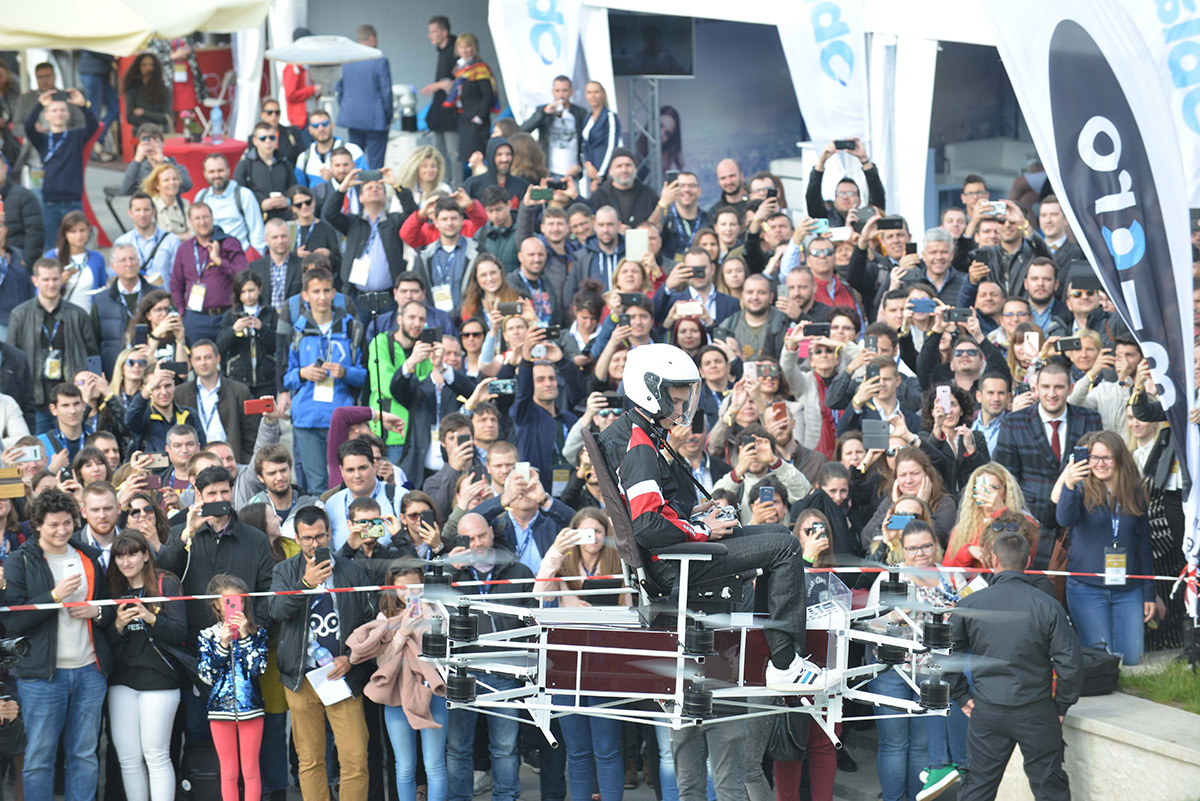 A demonstration of a drone that carries a person during Webit Festival.
Finally, smart cities are emerging as a critical component of the fight against climate change. Smart city technologies include energy-efficient buildings, smart grids, and intelligent transportation systems, which can reduce emissions and improve quality of life for urban residents.
While climate tech is a relatively new sector, it is rapidly growing and attracting significant investment. According to Pitchbook, a venture capital and private equity data platform, climate tech startups raised a record $16.1 billion in funding in 2020, up from $418 million in 2013. This trend is likely to continue as governments, investors, and consumers increasingly recognize the urgency of addressing climate change.
A demonstration of a drone that carries a person during Webit Festival.
Finally, smart cities are emerging as a critical component of the fight against climate change. Smart city technologies include energy-efficient buildings, smart grids, and intelligent transportation systems, which can reduce emissions and improve quality of life for urban residents.
While climate tech is a relatively new sector, it is rapidly growing and attracting significant investment. According to Pitchbook, a venture capital and private equity data platform, climate tech startups raised a record $16.1 billion in funding in 2020, up from $418 million in 2013. This trend is likely to continue as governments, investors, and consumers increasingly recognize the urgency of addressing climate change.
 Climate tech pstartup Ecotree pitch during the Founders Games during Webit Impact Forum 2022
Another promising area of climate tech is carbon capture and storage (CCS). CCS technologies capture carbon dioxide emissions from industrial processes or power plants and store them underground. This technology has the potential to significantly reduce emissions from industrial processes and power generation, but it is still in the early stages of development and requires further research and investment.
Climate-smart agriculture is another area where technology can help reduce emissions and increase resilience to climate change. Smart agriculture technologies include precision farming, which uses sensors and data analytics to optimize crop yields and reduce fertilizer use, and agroforestry, which combines crops and trees to increase carbon sequestration.
Sustainable transportation is another critical area where technology can make a difference. Electric vehicles are becoming increasingly popular as their performance and range improve, and charging infrastructure expands. Furthermore, new transportation technologies, such as autonomous vehicles and drones, have the potential to significantly reduce emissions and improve efficiency.
Climate tech pstartup Ecotree pitch during the Founders Games during Webit Impact Forum 2022
Another promising area of climate tech is carbon capture and storage (CCS). CCS technologies capture carbon dioxide emissions from industrial processes or power plants and store them underground. This technology has the potential to significantly reduce emissions from industrial processes and power generation, but it is still in the early stages of development and requires further research and investment.
Climate-smart agriculture is another area where technology can help reduce emissions and increase resilience to climate change. Smart agriculture technologies include precision farming, which uses sensors and data analytics to optimize crop yields and reduce fertilizer use, and agroforestry, which combines crops and trees to increase carbon sequestration.
Sustainable transportation is another critical area where technology can make a difference. Electric vehicles are becoming increasingly popular as their performance and range improve, and charging infrastructure expands. Furthermore, new transportation technologies, such as autonomous vehicles and drones, have the potential to significantly reduce emissions and improve efficiency.
 A demonstration of a drone that carries a person during Webit Festival.
Finally, smart cities are emerging as a critical component of the fight against climate change. Smart city technologies include energy-efficient buildings, smart grids, and intelligent transportation systems, which can reduce emissions and improve quality of life for urban residents.
While climate tech is a relatively new sector, it is rapidly growing and attracting significant investment. According to Pitchbook, a venture capital and private equity data platform, climate tech startups raised a record $16.1 billion in funding in 2020, up from $418 million in 2013. This trend is likely to continue as governments, investors, and consumers increasingly recognize the urgency of addressing climate change.
A demonstration of a drone that carries a person during Webit Festival.
Finally, smart cities are emerging as a critical component of the fight against climate change. Smart city technologies include energy-efficient buildings, smart grids, and intelligent transportation systems, which can reduce emissions and improve quality of life for urban residents.
While climate tech is a relatively new sector, it is rapidly growing and attracting significant investment. According to Pitchbook, a venture capital and private equity data platform, climate tech startups raised a record $16.1 billion in funding in 2020, up from $418 million in 2013. This trend is likely to continue as governments, investors, and consumers increasingly recognize the urgency of addressing climate change.
Secure your spot at Webit Impact Forum and learn more about the future of climate tech.
